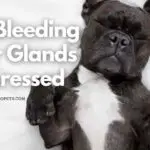As pet parents, we are all aware of the expression of the anal glands in our dogs. But, sometimes there are problems like Dogs Still Leaking After Glands Expressed.
Then, you need to carefully examine the cause. It becomes unavoidable even though you might hesitate to inspect your pet’s privates. So, let us see what you can do.
In this article, we will cover:
- Dogs Still Leaking After Glands Expressed
- 5 Signs That My Dog’s Anal Glands Are Still Leaking After Being Expressed
- And more…
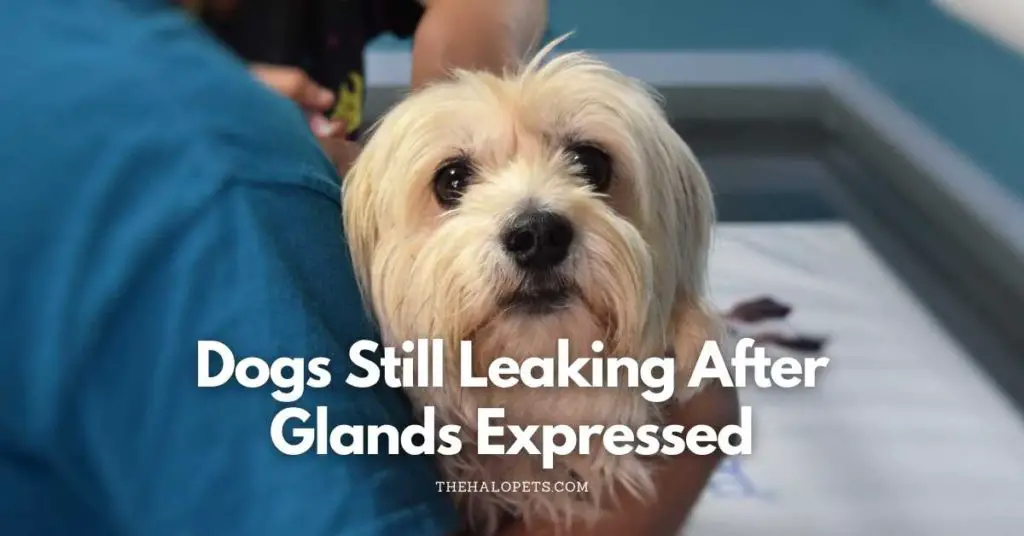
Dogs Still Leaking After Glands Expressed
Generally, it is normal for dogs to leak after anal glands are expressed for 1-2 days. After that, it may be a cause of concern as your dog might have developed an anal sac infection which can turn into an abscess in no time. Therefore, visit the veterinarian with your dog.
There isn’t anything alarming about leaking anal sacs after they have been expressed because of the residual fluid inside your dog’s rectum. It will generally pass after one or two days without causing you any issue.
However, if you still see your dog discharging fluid in the house and having a fishy smell, you need to watch out. This might be an indication that your dog is suffering from anal sac disease.
Anal sac disease progresses via three stages. Anal sac impaction, anal inflammation, and anal sac abscess are the three stages that will affect your dog one by one.
1. Anal Sac Impaction
When liquid collects and thickens in the anal sacs, they become swollen, heavy, and tough to empty, resulting in anal sac impaction, the first stage of anal sac disease.
The impaction is usually relieved by squeezing the anal sacs one by one until the thicker substance is expressed and your dog’s glands are completely empty.
2. Anal Sac Inflammation
Anal sacculitis, or inflammation of the anal sac, is the disease’s second stage. The anal sac material or secretions continues to accumulate at this stage.
Over time, the bad bacteria will multiply and cause infection. During this stage, the impacted fluid might become thin and fill with pus or blood.
3. Anal Sac Abscesses
Abscess creation is the third and final stage. This is the most serious and painful stage of anal sac diseases. During this stage, you will see a reddish-brown discharge from your dog’s anal glands. When you inspect the area, you will find it swollen and enlarged.
Additionally, the abscessed sac will rupture causing a big red hole near your dog’s rectum. It is where you will see a smelly liquid oozing out precisely. All of it may necessitate surgical intervention by a vet.
A veterinarian can treat anal sac illness at any stage. However, you must take prompt action so that the disease does not progress and reach its last stage.
5 Signs That My Dog’s Anal Glands Are Still Leaking After Being Expressed
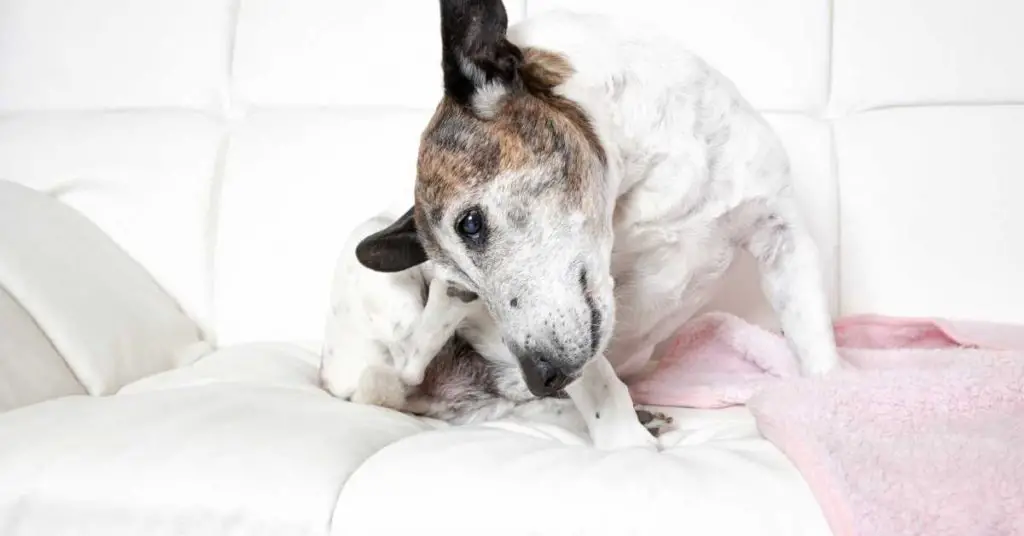
When your dog’s anal glands are leaking, you will possibly witness the following symptoms also after the expression of anal glands. If you notice a combination of these symptoms in your pet, assess the area and take it to the veterinarian:
1. Scooting Continuously
The American Kennel Club writes that scooting is one of the most common signs of the anal gland and sac issues in dogs. It is quite embarrassing, however, it is their way of telling you that there is something wrong with their butt.
Hence, dogs suddenly start scooting their backs randomly on the floor when they are irritated or in severe pain. A dog will scoot their back more than once and then lick it in most cases.
It is an indication that your dog has impacted and inflamed anal glands which might be the reason for the leak in your dog.
2. Itchy Butt
Although there could be several reasons for itchy butts in the dog- worms, skin infections, and food allergies, the most common among all is the anal gland issue that results in leakage after anal glands have been expressed.
You will generally see your dog dragging its bottom on the floor to relieve the itchiness, or trying to bite and scratch its tail and bottom. It indicates that your dog is in utmost discomfort due to anal gland infections and abscesses.
Till then, you can use a warm compress and hold it on your dog’s bottom for five minutes and then try to empty its glands. If the leaking does not stop, take it to the vet as soon as possible as the problem can worsen without proper treatment.
3. Swelling and Redness
If your dog has anal gland issues, you will witness swelling and redness around the sphincter in addition to the leaking after anal glands have been expressed.
When an abscess is ruptured, the area around it is red, swollen, and extremely painful. It is the last progressive stage of anal sac disease in dogs after inflammation and impaction. Thus, it requires veterinary consultation immediately.
4. Blood and Pus In Dog’s Stool

If your dog’s anal glands are still leaking after they are expressed, there is a chance that you might witness blood and pus in your dog’s stool.
In addition to it, dogs might have a hard time defecating. There could be a change in its consistency as well.
All of the above are signs that your dog had an anal sac infection after getting the anal glands expressed manually.
5. Fishy Smell Around The House
At times, you will notice that your house furnishings smell stinky and fishy after your dog sits on the sofa or bed after anal gland expression. You can also smell this foul odor near your dog.
After anal glands are expressed, dogs generally have this smell if you do not wash their backs properly. However, if you still witness this smell, it is evidence that the anal glands did not empty fully. It means your dog might still be leaking fluid in the house.
What Should I Do When My Dog’s Anal Gland Are Leaking After Being Expressed?
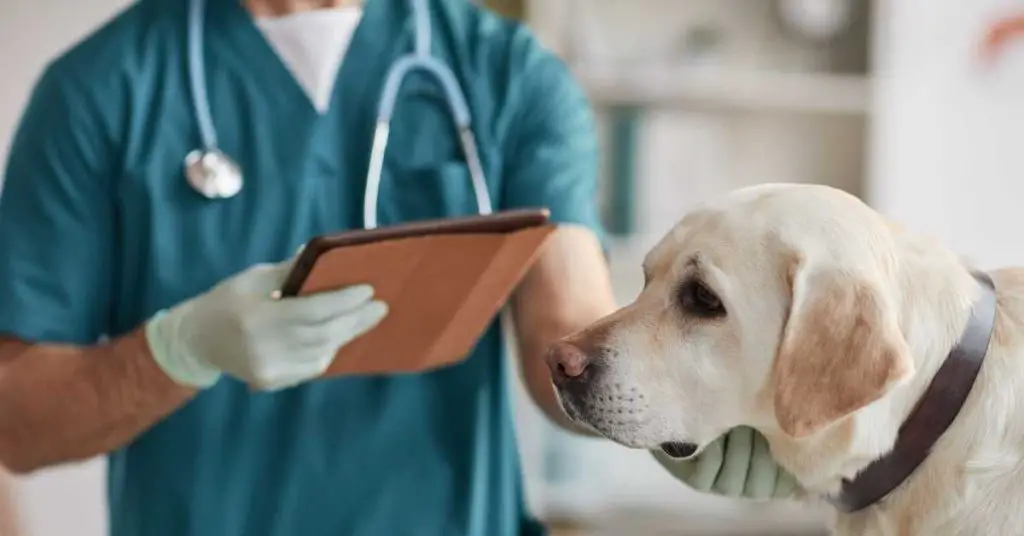
The best course of action is to book an appointment with your veterinarian and consult them regarding your dog’s issue as they will be able to guide you best. In worst-case scenarios, they might advise you to get the glands removed.
Dr. Tammy Hunter, DVM and Dr Ernst Ward, DVM at the VCA Hospital suggest pain relief medications such as Meloxicam for inflammation and redness in the butt of your dogs after anal glands have been expressed.
Meloxicam is an anti-inflammatory drug that can relieve pain, inflammation, and fever in dogs and cats. Thus, it can ease your dog’s discomfort due to the infection or abscesses. It is available as chewable tablets and injections for your dogs. You can give it to your dog till the swelling reduces.
Antibiotics like Clindamycin are also prescribed for oral consumption in the form of liquid, tablets, or capsules. According to Dr. Rania Gollakner, DVM at the VCA Hospitals, it helps to treat abscesses and infections in dogs.
Since the medicine is bitter, we advise you to hide it in your pet’s favorite food and then feed them. And of course, these medications should only be given after the vet thoroughly examines your pet, and prescribes the same.
How Do I Know That My Dog’s Anal Glands Are Empty?
When you are done expressing the anal glands manually, the anal sacs will deflate. The fluid will cease draining from the glands. Once that happens, wipe your dog’s bottom gently to remove any fluid that has become trapped in the fur.
If you are unsuccessful after a few attempts, stop and do not force your dog. Repeated massaging and squeezing of the glands might result in pain, redness, swelling, and the worst-case bruising. It may aggravate the problem further.
Try again the next day. If you are not able to do it manually by yourself, make an appointment with your veterinarian and let them do it for you.
How To Prevent My Dog’s Anal Glands From Leaking?
Anal glands leak when they are full, infected, or impacted. As a result, dogs are unable to empty their glands on their own which can be extremely troublesome for our furry friends. Thus, as conscious pet parents, most of us have to resort to anal gland expression manually or visit the vet frequently to get the treatment done.
But, what if we told you, you can prevent these things from happening if you took slightly more care of your dog. Inculcating adequate high-fiber food is essential for your dog’s anal gland expression on its own for a long-term solution for natural gland expression in dogs.
Sweet potatoes, pumpkins, beet pulp, lettuce, apples, and green beans are all high in fiber. Thus, you should make sure you talk to your vet and add them to your pet’s diet. However, make sure you duly note your dog’s food allergies and avoid giving them such food.
Also, adding fiber does not mean that you only make your dog have fibrous food all the time. It is equally essential that your dog takes other nutrients like carbs, proteins, vitamins, and minerals in the required amount for proper bowel movements.
Additionally, feed your dog commercial dog food that is high in fiber and has easily digestible proteins. Probiotics can also be added to your dog’s diet to help with intestinal health. Purina Fortiflora Probiotics for Dogs is our recommendation.
In addition, make sure your dog gets lots of activity and drinks plenty of water. A healthy dog may pass feces readily, indicating that anal gland expression and fluid secretion are not a problem.
Also Read: A Guide To Getting Your Dog’s Diet Right
Does A Dog’s Anal Gland Leak When It Is Asleep?
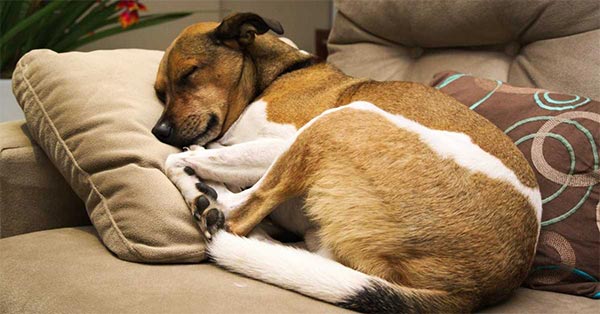
Yes, anal glands can leak when your dog is asleep. It is because the dog’s anal glands are impacted. As a result, they have become full of fluid and have started leaking.
However, there are other reasons for it as well. You do not need to worry sometimes because dogs express their anal glands in sleep when they feel strong emotions.
A stressful, exciting, or scary dream may lead to anal gland expression in dogs. It is why you might see a slight discharge on your dog’s bed after they wake up. We will advise you to check your dog’s back to clear any suspicions.
Why Is My Dog Still Scooting After Glands Expressed?
According to American Kennel Club, dogs scoot after anal glands have been expressed due to clogged anal glands. When dogs poop, they discharge a foul, fishy-smelling liquid from two small anal sacs on either side of their back end.
Your dog’s anal sacs are normally emptied when he has a bowel movement. The fluid can build up if they aren’t performing properly. Inflammation of the glands in the sacs causes the liquid to harden, making it difficult to discharge. It can be uncomfortable and potentially infectious when the sacs are constantly filled or not draining adequately.
Secondly, some dogs have trauma after anal glands are expressed manually by the veterinarian or groomer. A dog’s anal sacs can be manipulated when they continuously squeezed and massaged. As a result, the anal sac tissues can become inflamed resulting in improper functioning.
Thus, it is best to hire a groomer who is proficient in the manual expression of glands as they will be the first ones to notice any changes in your dog’s anal glands.
Also Read: 8 Reasons Why is my Dog in Pain After Glands Expressed? +6 Tips
What Happens If I Don’t Express My Dog’s Anal Glands?
Expressing your dog’s anal glands routinely is very important. If the anal gland does not get expressed on a regular basis, your dog’s anal sacs can become infected.
This causes the anal sacs to swell up, causing enormous pain and discomfort. The sacs may be unable to express normally if they become infected and irritated.
It is when you should manually express the anal glands of your dog to help him. Or, you can consult a veterinarian if you are unaware or skeptical to do it on your own.
